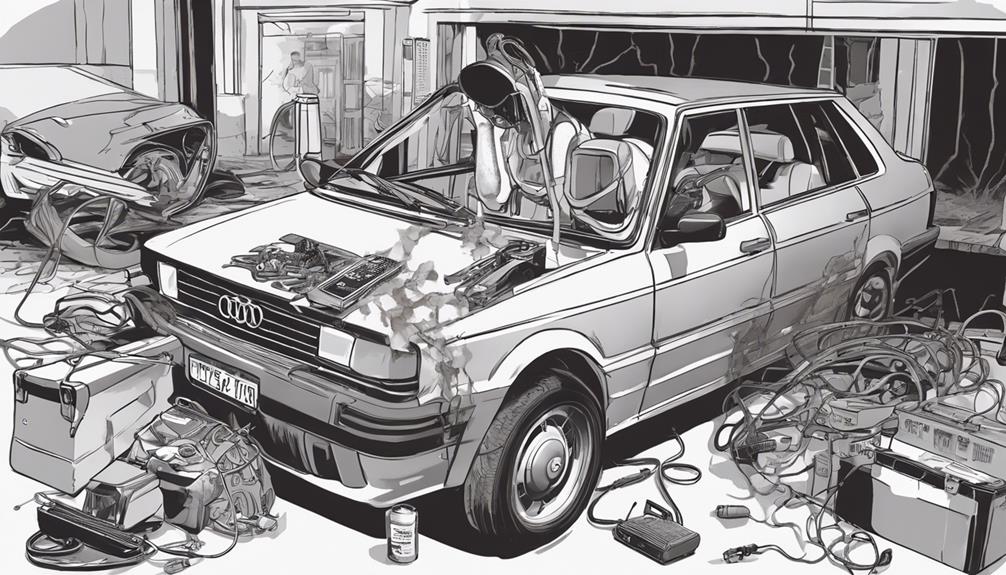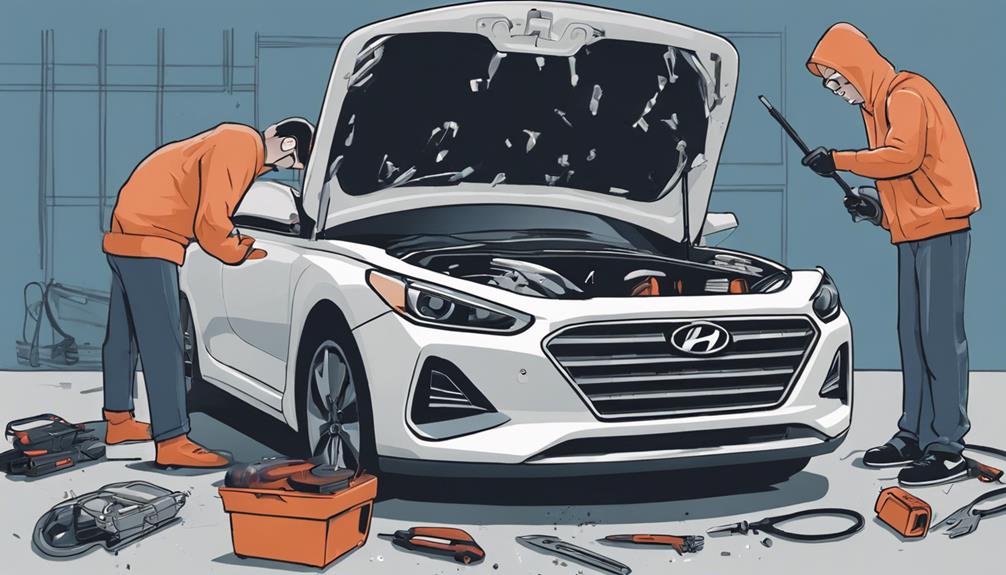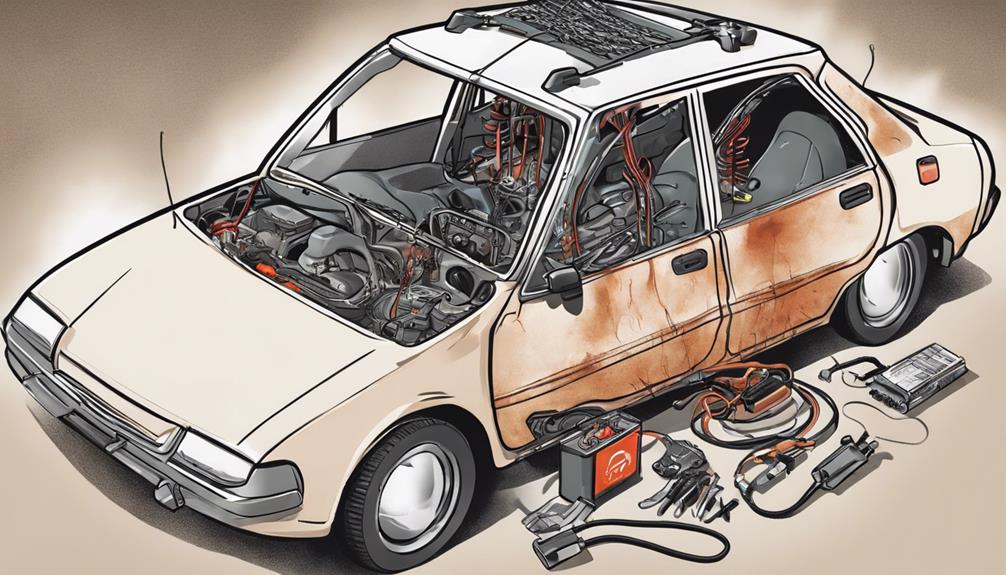If your Audi won't start, several common culprits could be at play. Start by checking for fuel pump failure, wiring issues, or a weak battery affecting the starter motor. Ensuring your battery is in top shape, inspecting the fuel system, and addressing any strong fuel smells are important initial steps. Starter motor problems and ignition switch malfunctions are also potential causes. Understanding these key issues and fixes can help you troubleshoot effectively and get your Audi running smoothly again.
Key Takeaways
- Check fuel pump function and pressure.
- Inspect battery for corrosion and tight connections.
- Test starter motor for faults.
- Address fuel system adaptations cautiously.
- Verify strong electrical connections.
Common Causes of Audi Not Starting

When your Audi refuses to start, it's often due to common issues like fuel pump failure or wiring problems. The intricate dance of components in your car's system can sometimes lead to a no-start situation.
One culprit could be your battery not providing enough power to kickstart the starter motor into action. A weak battery might struggle to turn over the engine, causing frustration.
Another suspect could be the starter motor itself, an essential player in the starting process. If this component malfunctions, it can bring your morning routine to a screeching halt.
Wiring problems, like a corroded connection between the battery and the starter motor, can also play a role in the drama. Ensuring that these electrical pathways are clear and strong is essential for a smooth start every time.
Checking Battery and Connections
To ensure your Audi starts smoothly every time, it's vital to regularly inspect and maintain the battery connections for any signs of corrosion or damage. Ensuring a strong connection between your car battery and its terminals is essential for avoiding starting issues.
Here are some key points to keep in mind:
- Corrosion Check: Examine the battery terminals for any accumulation of corrosion, which can impede the flow of electricity.
- Tightness Test: Ensure the battery cables are firmly connected to the terminals to maintain a proper electrical circuit.
- Cleaning Routine: Regularly clean the battery terminals using a mixture of baking soda and water to eliminate any corrosion.
- Visual Inspection: Look for any fraying or damage to the cables that may hinder the transfer of power.
Inspecting the Fuel System
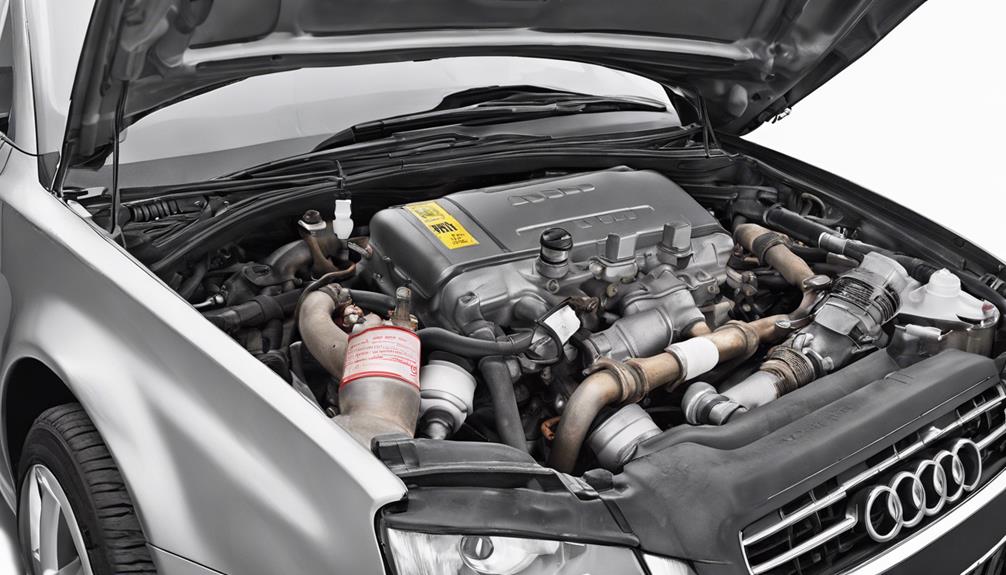
Examining the fuel system involves a thorough evaluation of important components such as the fuel pump, injectors, tank, lines, and pressure levels to guarantee peak engine performance.
To begin, check the fuel pump for proper function. Test fuel delivery and pressure to make sure it's within the manufacturer's specifications. A faulty fuel pump can lead to inadequate fuel reaching the engine, causing starting issues.
Next, inspect the fuel injectors for clogs or blockages that may impede fuel flow. Clean or replace any obstructed injectors to restore proper fuel delivery.
Verify that the fuel tank contains a sufficient amount of fuel for the engine to start. Lack of fuel due to an empty tank will prevent the engine from running.
Additionally, look for leaks in the fuel lines that could be causing fuel system issues. Leaks can lead to a decrease in fuel pressure, impacting engine performance.
Addressing Fuel System Adaptations
Addressing fuel system adaptations requires a keen understanding of how resetting adaptations can impact fuel delivery and diagnosing issues related to the fuel pump fuse in Audi A4 models experiencing starting troubles. When tackling fuel system adaptations in your Audi, consider the following:
- Resetting Fuel System Adaptations: Be cautious when resetting adaptations, as it can result in fuel delivery issues post a battery change.
- Fuel Pump Fuse Inspection: Always check the fuel pump fuse when dealing with Audi A4 cranking but not starting problems.
- Scanning for Error Codes: Scan for stored error codes to pinpoint the underlying cause of fuel system adaptations acting up.
- Proper Diagnosis: Avoid resetting fuel system adaptations without proper diagnosis to prevent exacerbating the situation.
Dealing With Strong Fuel Smell
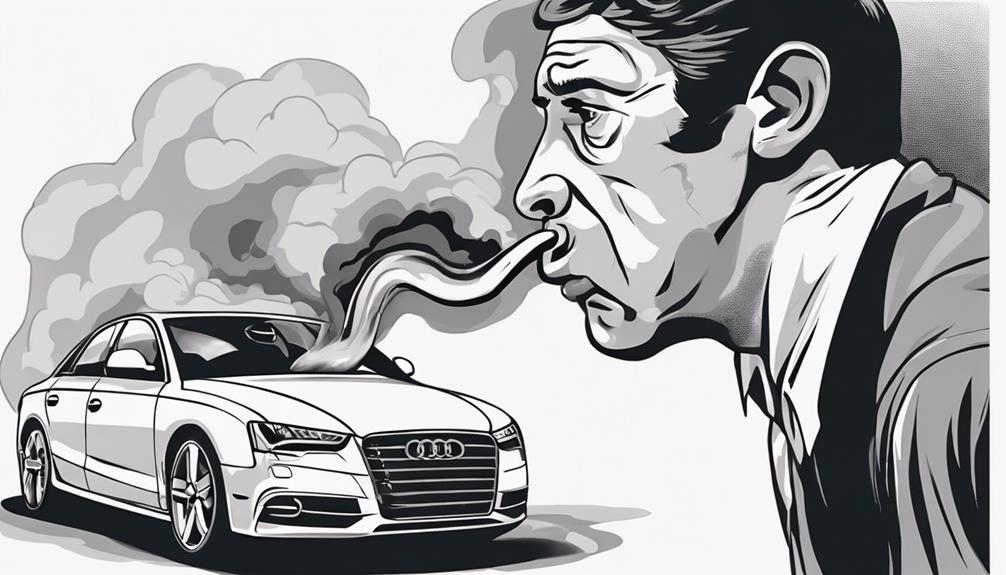
If a strong fuel smell permeates your Audi, prioritize safety by parking in a secure location and promptly shutting off the engine to prevent potential risks.
Mitigate the danger of fire or explosion by steering clear of ignition sources and ventilate the vehicle by opening windows and doors.
To address the issue effectively, it's advisable to have the fuel leak detected, the ventilation system checked, and seek professional inspection as needed.
Fuel Leak Detection
When you detect a strong fuel odor coming from your Audi, it's important to act promptly to guarantee the safety of both your vehicle and yourself.
Here are some steps to deal with a strong fuel smell:
- Park your Audi in a safe location to avoid fire hazards.
- Turn off the engine and steer clear of ignition sources.
- Ventilate the car by opening windows and doors to disperse the fumes.
- Consider calling for towing and professional inspection if you suspect a fuel leak.
Addressing the issue of a strong fuel smell promptly can prevent potential dangers and safeguard the well-being of your Audi and its occupants.
Ventilation System Check
Upon detecting a strong fuel smell in your Audi, the ventilation system inspection becomes crucial to guarantee the safety of your vehicle and those inside.
To start, park the car in a safe area away from any ignition sources and turn off the engine immediately. Ventilate by opening windows and doors to disperse the fuel odor. Starting the engine in such a situation could lead to serious hazards.
Check the fuel filter for any signs of leaks or clogs that might be causing the issue. Remember, a strong fuel smell indicates a potential fuel system problem that necessitates prompt attention.
Avoid starting the car and seek professional help to make sure a thorough inspection and necessary repairs are done to keep you safe on the road.
Professional Inspection Needed
To guarantee your safety and address the issue of a strong fuel smell in your Audi, seeking a professional inspection is essential. When dealing with a strong fuel smell, certain key factors like the ignition switch and clicking noises must be considered. Here's why a professional inspection is necessary:
- Expert Diagnosis: A trained mechanic can pinpoint the precise source of the fuel smell.
- Preventive Maintenance: Regular inspections can avert potential hazards or breakdowns.
- Specialized Equipment: Professionals have tools to conduct thorough checks effectively.
- Peace of Mind: Knowing your Audi has been inspected by a professional can alleviate concerns and ensure safety.
Don't delay – schedule that professional inspection to keep your Audi running smoothly and securely.
Safety Measures While Diagnosing
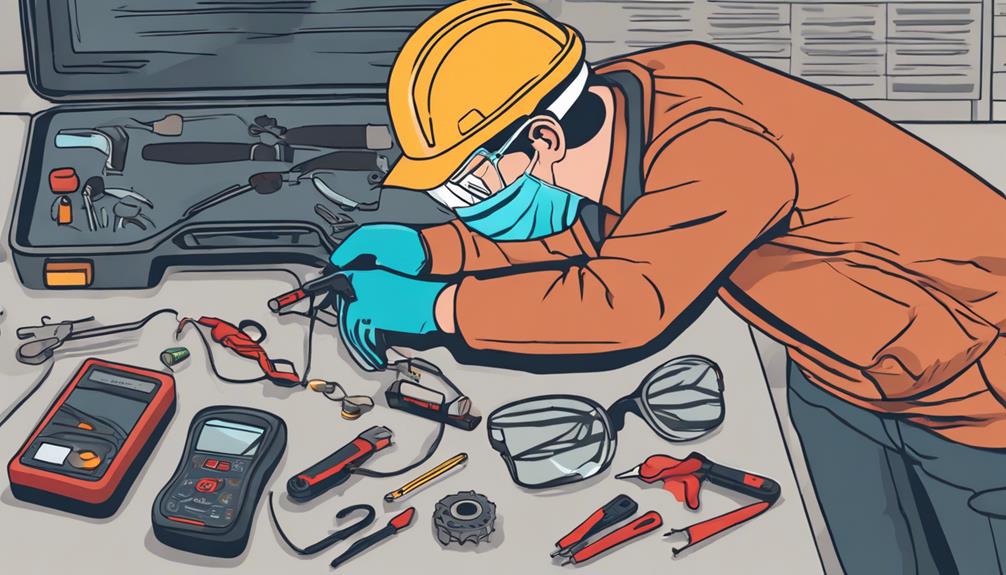
During the diagnostic process, prioritize safety by thoroughly examining battery connections and inspecting the fuel system for potential hazards.
Commence by verifying the battery connections are secure and free of corrosion to enable proper electrical flow. Any loose or damaged connections could hinder the starting process or even present a risk of electrical issues.
Proceeding to the fuel system, carefully inspect for leaks that could result in hazardous situations. Address any potential adjustments cautiously, as interference without the necessary expertise could exacerbate the issue.
If uncertain, it's advisable to seek a professional diagnosis to accurately and safely troubleshoot the starting problem. Remember, resetting fuel system adjustments without proper knowledge might have negative impacts on the vehicle's performance and safety.
Fixing Audi Starting Issues
When addressing Audi starting problems, a detailed examination of the fuel pump for proper function is crucial to guarantee sufficient fuel delivery. Here are some practical steps to help you resolve your Audi's starting issues:
- Check Battery: Make sure the battery connections are secure and consider installing a new battery if needed.
- Inspect Electrical System: Look for faults in the electrical system components that could be hindering the starting process.
- Listen for Clicking Sounds: Pay attention to any clicking sounds when you try to start the Audi, as this could indicate issues with the starter motor.
- Check Engine Light: If the check engine light is on, it could provide clues to the underlying problem with the starting system.
Frequently Asked Questions
How Do You Manually Start an Audi?
To manually start your Audi, insert the key, turn it to 'Start.' Make sure it's in Park/Neutral. Listen for engine cranking. If it doesn't start, check warning lights. Refer to the manual for specific instructions on your model.
Why Is My Audi Clicking but Not Starting?
When your Audi clicks but doesn't start, it often signals a failing starter motor. Address this issue promptly to avoid complete engine failure. Consult a certified mechanic for diagnosis and replacement. Don't delay!
Why Is My Audi A4 Turning Over but Not Starting?
If your Audi A4 is turning over but not starting, try checking the fuel pump fuse, resetting fuel system adaptations, and scanning for fault codes. Addressing these issues can help diagnose and fix the starting problem.
Why Is My Engine Not Trying to Start?
When your engine refuses to start, it could be due to a faulty fuel pump, ignition switch issues, starter motor problems, or electrical system malfunctions. Ignition problems like a worn-out switch may also prevent starting attempts.





